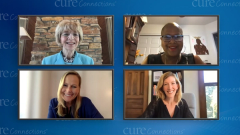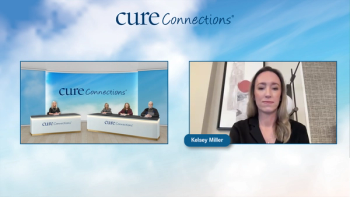
Addressing Racial Disparities in Breast Cancer
The panel elaborates on the racial disparities in the care of breast cancer and the need for systemic change to address these disparities.
Episodes in this series

These are the experiences and opinions of panelists, not physicians.
Lisa Laudico: It just strikes me when Sheila is mentioning like leave the bias at the door and I think it's also important to mention that the statistics that are just horrific and as Sheila said have not changed. They're just so entrenched and they just keep on going and that they actually did those statistics as I understand it and they controlled for socioeconomic factors. Think about that. So, me as a white woman living in Connecticut compare me with a black woman living in my same town in Connecticut and that black woman is going to live- If she has metastatic breast cancer, she would die 42% quicker than I would. Now, that's what the statistic says. Now, we know with statistics, you have to control or look at all over the United States and as Sheila correctly pointed, you've got NCI designated cancer institutes and then you've got your community health centers and I do think that let's be real, bias is everywhere and you will find leading institutions and they're going to be evaluated for are your doctors, oncologists, nurses are- Where are you at on the bio-scale when you're treating patients of color and oddly enough, it's against what we would think would be happening. It's not so great sometimes even in those very prestigious institutions. That is why we are still at 42% or 40%. It's how it's being measured. In the community health centers, you're going to lucky sometimes but sometimes not and I think that absolutely every single person who cares about individuals living with metastatic breast cancer and our black sisters and brothers who clearly are not getting the same level of care because the stat is still not changing, so we all need to work together. I just want to end with saying that in living with metastatic breast cancer, being someone who cared so much about social justice prior to my diagnosis, it just feels to me like there's so many things in our society that doesn't support those that are ill, those that are less than according to the perfection that we have in society, and I think that we as metastatic breast cancer patients, we're taking on these really big issues. Racial inequity, racial disparity, grief and loss is not talked about, illness isn't talked about. It's all what we are at the forefront of and so it gets me up in the morning I'm telling you.
There's crap out there that we need to think and that's what gets me out of bed in the morning. It's really so important to link arms with incredible leaders like Sheila and just tell me where to go and what to do, Sheila.
Sheila McGlown: Very well said. Even for treatments for black women, it's a difference. Black women are delayed treatment for almost 60 days whereas white women aren't. But why is that? Because I'm black that my treatment is delayed or even like I was saying for financial toxicity-
Lisa Laudico: Let's talk about that.
Sheila McGlown: Black women sometimes they have to stop treatment just to put food on the table but colleagues and doctors and medical professionals and nurses and their whole team like Dr. Larson was saying was they need to know their patience from the beginning like "I want you to put it out there out front what I need to know, if you need a social worker with financial or whatever". Why not say this on the first day. I know that in your mind, you're like "OK, diagnose, I'm going to hear nothing the doctor says" or even tape, record the conversation, or write down the questions and that's why I say it's important for me to continue to talk about palliative care and copays and how you could get them or free mammograms or self-breast exam, talking about things like that. It's so much more, so much broader and it's like they're doing all these studies and it's like "What are we doing with the studies? Are we bringing them back into the community, trying to find out how we can fix it, or are we doing studies just to be doing studies?"
Lisa Laudico: Exactly. It's time for action and changes of standard of care. That's mandatory standard of care when you're diagnosing someone- When someone's hearing for the first time, "I'm really sorry but it is stage four, you have metastatic breast cancer. This is what you can hear today but I'd like you to come back and talk to me in a week and I'm going to have a social worker there for you and we're going to have a financial advisor there for you and this is going to be a group team meeting". That should be standard of care in the United States in 2021, that you have that second appointment which is all about "This is what we got, this is how we're going to help you" and that should be standard, and I don't care if you're a green Martian, that's what everybody should get.
Shirley A. Mertz, MA, JD: Yes. Very well said.
Sheila McGlown: And just please stop blaming it on the patient.
Lisa Laudico: Thank you. Good luck.
Sheila McGlown: It's not the patient's fault that they don't know this.
Lisa Laudico: Exactly right.
Sheila McGlown: It's the medical professionals or the oncologist or whoever. We need to place the blame where the blame deserves to be. So quit blaming it on the patients and quit blaming it- Well, they're mistrust. Well, educate me. I still had to be educated about certain things like when my doctor said, stable, I'm just crying because I didn't know what it means but it's a medical term. I'm sitting there crying, she was like "Why are you crying?" and I said, "Well, what does stable mean?" She said that means you're not progressing. But something as simple as that and I understood it, don't dumb it. You don't have to dumb it down, just give me the truth upfront. Like I said, just treat me as a human and treat me as a- Not as a subject but as a patient.
Shirley A. Mertz, MA, JD: Start with me where I am and then take me forward, what do I need to know, and how do I get it. Julie, I don't mean to put you on the spot, but do you find that there are fewer African American women or women of color that take advantage of say counseling?
Julie Larson, LCSW: Yes, there are.
Shirley A. Mertz, MA, JD: There are.
Julie Larson, LCSW: Yes. There are fewer women of color in support groups that reach out and use any of these advocacy nonprofit organizations. I am on the scientific medical advisory board for a prominent non-profit and one of the main things we keep talking about is we this organization, in particular, is a leader in young adults diagnosed with cancer and we know that people of color get cancer but why aren't they showing through up through the door. Why aren't they coming? What is happening there? And I think there's a level of comfort, I think it's a level of feeling that sense of inclusion. Are we talking about the things that matter to you, is there a sense of trust, where do you find one another, are you the only one in the room? I think all of that trust-building and we just need to meet the entire thing with curiosity and care.
This transcript has been edited for clarity.




